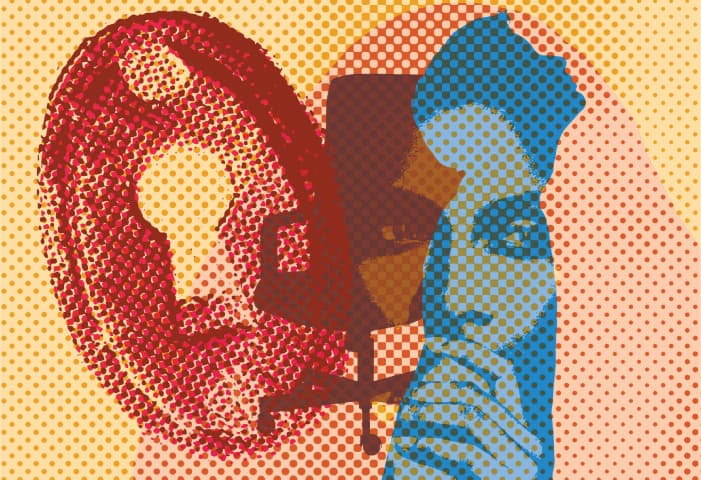
When I was 16, I moved from Karachi to London and was enrolled in a school on Baker Street. I mention where the school was located because I lived in Mile End — a world and a long train ride away. Today, Mile End is hipster central but, then, we lived on a council estate, near a park that, if you had any sense, you would not venture into once the sun set, and one night the windows of our flat lit up in blue and red because the police found a body in a garbage bin.
I was the only Pakistani transplant at my school and the girls there did not live on estates — at least, I never met a single one who did. When they asked me where I lived, I said, “Mile End”, and I later found out they liked to ask me this because there was a joke about how I sounded like I was saying “my land.” I figured that they weren’t big on geography or other cultures at this school because I was persistently asked if I was really from Africa, if I had a camel, how I managed to get anywhere in my country without a car, and the only answer that seemed to make sense was that I came from “near India.” Very quickly, I developed a mongrel accent. I didn’t want to try and fail at sounding British, so I did the next best thing: I tried to sound American. If I was going to be different anyway, if I wasn’t going to be one of them, perhaps I didn’t have to sound like I was from “near India.” One day at a traffic light, a British woman asked me for directions and, as I answered, she stared at me and asked admiringly, “But how do you speak English so well?” Tired, I said, “I learned it from the TV.” She nodded like, of course.
I thought of those days, 16 years ago, when I read Fatima Bhutto’s latest novel The Runaways. There’s a character named Sulaiman Jamil in it, a man who watches every Bond film he can find in Lucknow. In dark cinema halls, he takes in every shaken-not-stirred martini and car chase, every secretary in an MI6 office, every sharp suit and each seduction, and emerges bleary eyed into the world and exclaims, “Bhai, those offices… they were so neat and clean!” When Sulaiman books a one-way ticket from India to the United Kingdom to make his fortune there, he doesn’t dream of being Bond, doesn’t hope for the suits and martinis — no, it is enough that he is near them. Near the possibility of offices filled with secretaries with beautifully manicured nails tapping away at their typewriters, near all the order and neatness and promise of that world.
Fatima Bhutto’s sophomore novel is a tender account of how identity, representation, alienation, faith and desire are lived and experienced and indicates how she has grown as a writer since her debut novel five years ago
Sulaiman lands in Portsmouth and finds “kitchens smelling of curry, the toxic scent of methi clinging to the walls, everyone ... keeping their heads down and holding their breath in the dreadful anticipation of something greater that never seemed to come.” No matter how much time passes, no one here cares that Sulaiman has earmarked pages of How to Dress Like a Quintessential English Gentleman or knows how to tie the perfect Ascot. He joins yoga classes and book clubs, takes Latin dance lessons, develops a crisp accent — none of it matters.
And so all of Sulaiman’s dreams of making a life in this place come to rest on the shoulders of his son, Sunny. The mantras he raises his son with are: “Be someone else. Do something else. Be better. Fit in more, try more, work hard. Don’t get stuck in a dead end job...” But all Sunny sees in his father is the husk of a man spat out by a place that does not need him. Sunny takes his mantras from rapper Tupac Shakur: you either evolve or disappear. And how can you evolve — become stronger and better — how can you outrun the people you’re supposed to emulate in order to survive among them? Become what they fear. When Sunny’s cousin Oz returns from volunteering in refugee camps around Syria, talking about how the azaan in Aleppo is “the most beautiful sound you ever heard”, Sunny finally finds an ally who understands that he just doesn’t ‘fit in’ in Portsmouth, and doesn’t really want to.
Meanwhile in Karachi, we meet Anita Rose, whose mother massages away the aches of rich women, and Monty, whose father owns half the city and whose mother is under the spell of a televangelist named Rami Nayar and searching for maids — she has to get rid of her Filipina staff after her preacher tells her “it was wrong to have attractive young Christians in close proximity to husbands and sons.” As Anita is subsumed into the world of a mysterious neighbour who will teach her how to escape the life of servitude she seems destined for, Monty falls hard for Layla, a new student at the American School of Karachi, who arrives with little explanation and many rumours (“she had neither the resting bitch face of a Grammarian, nor the accent ... her father was an Indian drug lord ... she was a plant from the American Embassy ...”).

In this day and age, in this news cycle, it is not remarkable that the lives of these young characters intersect in a place such as Mosul, Iraq. We have read and seen enough to know that that is possible. That part of the story — the siren song of jihad, the parallels with ISIS — may become the thing that is talked about the most, but to focus on that is to lose out on what is a tender account of how some of the buzzwords of this time — identity, representation, alienation, faith, desire (and its denial) — are lived and experienced.
It is exciting to see how Bhutto has grown as a writer in the five years since her debut novel, The Shadow of the Crescent Moon. When writing about religious extremism and its violence, it would have been easy to veer into caricature, but Bhutto has created characters who we would never want to know in real life, but we end up rooting for nonetheless. There are no redemptions, no relief of closure and no characters who wring their hands about what terrible people they’ve been and all the terrible things they’ve done. You care for them anyway. You want to forgive them.
Bhutto told me that she first started thinking about this story in 2014, when ships filled with migrants turned up on the coasts of European countries. Travelling at the time, Bhutto heard acquaintances complain about “those people” trying to gatecrash a country, bringing “their culture” to a place that didn’t want them. It wounded her, she recalled, and The Runaways is really about that moment: the violence of being cast out, of never belonging, of the times when you would willingly stamp out whatever it is in you that renders you different, whether that means faking an accent or being unable to tell a stranger at a traffic light that you’ve been made to speak their language for so long, you’ve all but forgotten your native tongue.
The reviewer is the author of The Sensational Life and Death of Qandeel Baloch
The Runaways
By Fatima Bhutto
Penguin, India
ISBN: 978-0670088515
402pp.
Published in Dawn, Books & Authors, October 7th, 2018

















































